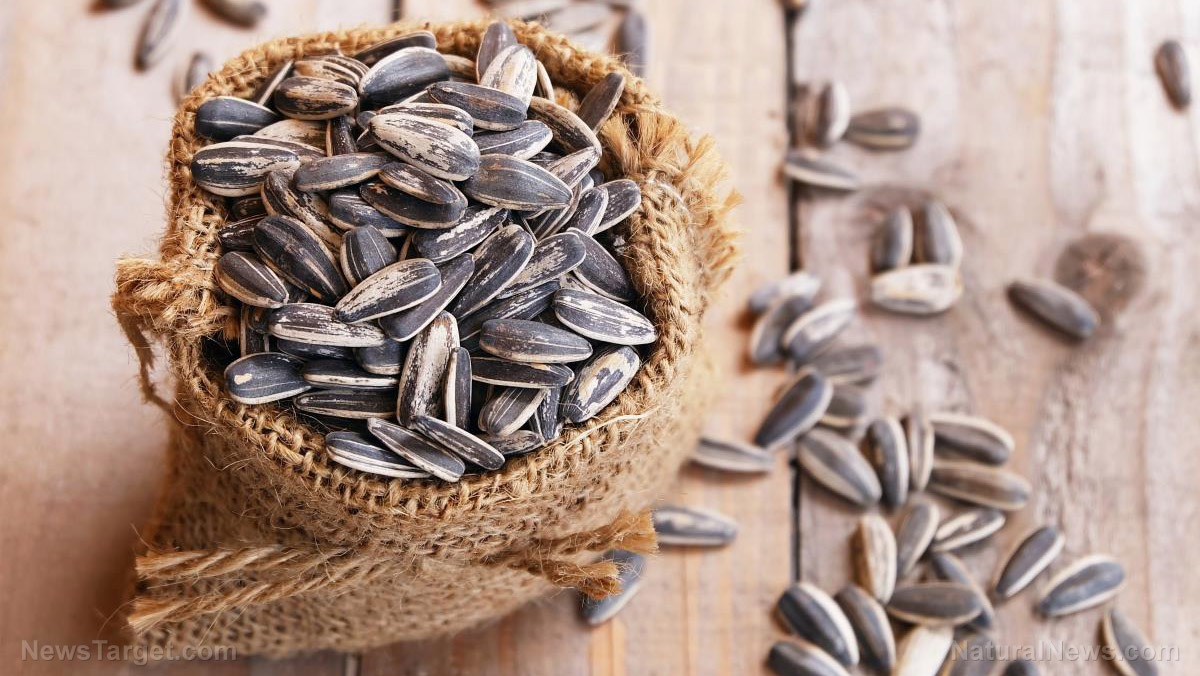Learn about brain health and nootropics to boost brain function
Sunflower seeds are a delicious, healthy source of vitamin E



(Natural News) Sunflower seeds are delicious, healthy superfoods that can be eaten on their own or added to other healthy snacks. They are particularly rich in vitamin E, providing nearly 40 percent of your recommended daily intake of the vitamin with one serving.
Also known as alpha-tocopherol, vitamin E is a fat-soluble compound that has potent antioxidant properties. This means that it can protect the body from free radicals, which are metabolic byproducts that oxidize, damage, and age your cells and tissues.
Vitamin E may also reduce your risk of heart disease. Studies found a link between vitamin E and a lower risk of cardiovascular disease. This effect may likely be due to its anti-inflammatory properties. Vitamin E also plays a role in many physiological and metabolic process in the body, such as immune function, cell communication, and gene expression. (Related: Vitamin E slows aging, grows hair, prevents diabetes, improves brain function and blood flow.)
Other health benefits of sunflower seeds
As a superfood, sunflower seeds offer many other health benefits alongside vitamin E.
- They contain other antioxidants – Sunflower seeds contain other antioxidants such as selenium. They are also a good source of beneficial plant compounds, such as phenolic acids and flavonoids, which also function as antioxidants. Antioxidants help prevent chronic diseases.
- They fight inflammation – A study published in the American Journal of Epidemiology found that in more than 6,000 adults, those who reported eating sunflower seeds and other seeds at least five times a week had 32 percent lower levels of C-reactive protein than those who did not eat seeds. C-reactive protein is an inflammatory marker linked to an increased risk of heart disease and Type 2 diabetes. The vitamin E in sunflower seeds is also known to help lower the levels of C-reactive protein. In addition, the flavonoids and other plant compounds in sunflower seeds also help fight inflammation, according to a study published in the Chemistry Central Journal.
- They help prevent heart disease – As mentioned earlier, the abundance of vitamin E in sunflower seeds help lower your risk of heart disease. However, there are many other components in sunflower seeds that contribute to that effect. For one, sunflower seeds contain magnesium, which helps lower blood pressure. They are also rich in unsaturated fatty acids, particularly linoleic acid. The body uses linoleic acid to produce a hormone-like compound that relaxes blood vessels, which in turn lowers blood pressure. This fatty acid also helps reduce cholesterol levels.
- They may help in blood sugar control – There is some evidence suggesting that sunflower seeds may be beneficial to people with Type 2 diabetes. Studies found that people who ate at least 30 g of sunflower seeds every day as part of a healthy diet may lower their fasting blood sugar by about 10 percent in just six months compared with those who ate a healthy diet alone. Researchers suggested that the blood sugar-lowering effect of sunflower seeds may be in due part to their chlorogenic acid. The protein and fat in sunflower seeds also slow the rate at which your stomach empties, which allows a slower release of sugar from carbs.
| Discover how to prevent and reverse heart disease (and other cardio related events) with this free ebook: Written by popular Natural News writer Vicki Batt, this book includes everything you need to know about preventing heart disease, reversing hypertension, and nurturing your cardiac health without medication. Learn More. |
It is also worth noting that sunflower seeds are calorie-dense, so avoid eating too many to prevent unwanted side effects. You can buy sunflower seeds either in the shell or as shelled kernels. These seeds can be eaten as a snack or added to various foods, such as trail mix, salads, and baked goods.
Sources include:
Click here to view full article